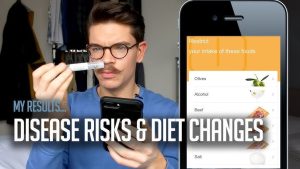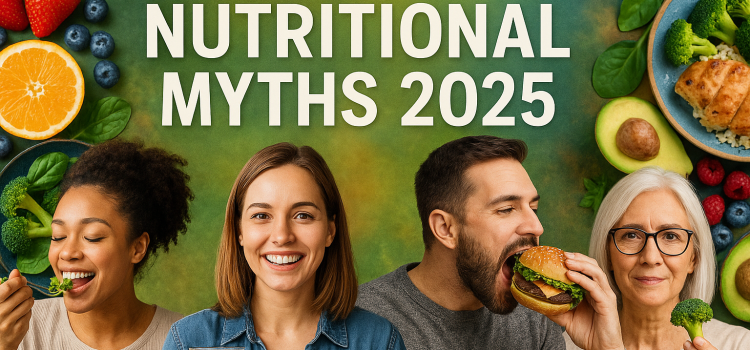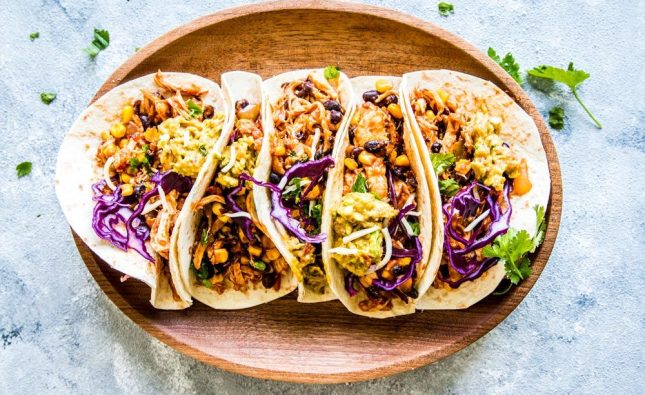
Introduction
Every year brings a new wave of diet tips and food fads. By 2025, it can feel impossible to know what to eat. Social media, influencers, and even some well‑meaning experts spread ideas that aren’t always true. This flood of advice can lead to confusion, poor food choices, or diets that are hard to maintain. In this article, we’ll clear up common nutrition myths and share practical tips. You’ll learn which foods to focus on and how to separate fact from fiction so you can eat with confidence in 2025.
What Are Nutritional Myths?

Nutritional myths are misconceptions or false beliefs about food and health. They often spread through social media, influencers, and even some health professionals, leading to confusion about what foods are healthy and what are not. These myths can sometimes lead to poor eating habits, diets that are difficult to maintain, or unhealthy fat foods and miss important nutrients that increase the risk of heart disease and also increase the risk of type 2 diabetes.
In the United States in 2025, it’s more important than ever to break free from these myths and make decisions based on real facts great source nutrition. Let’s look at some of the most popular myths and reveal the truth behind them.
Top Nutritional Myths Busted for 2025

1. Myth: “Carbs Are the Enemy”
For years, low‑carb diets have claimed that cutting out all carbohydrates is the best way to lose weight. While refined carbs like sugary drinks and white bread can spike blood sugar and add empty calories, whole‑food carbohydrates are essential. Foods such as brown rice, oats, sweet potatoes, fruits, and vegetables provide fiber, vitamins, and steady energy.
Tip: Swap out sugary snacks for whole fruits. Choose whole‑grain breads or brown rice over white. These choices keep you full longer and support digestion.
2. Myth: “All Fats Are Bad”
Decades ago, fat was blamed for heart disease, prompting people to avoid it entirely. Today, we know that not all fats harm health. Unsaturated fats—found in olive oil, nuts, seeds, and avocados—can improve cholesterol levels and support brain function. It’s the trans fats (in many processed snacks) and excess saturated fats (in fatty meats and full‑fat dairy) that you want to limit.
Tip: Cook with olive oil instead of butter. Snack on a small handful of nuts. Add avocado to salads for a dose of healthy fat.
3. Myth: “Eating Fat Makes You Fat”
Weight gain comes from consuming more calories than you burn, not from eating fat alone. In fact, including healthy fats in your meals can help you feel satisfied so you’re less likely to overeat. These fats also help your body absorb fat‑soluble vitamins (A, D, E, and K).
Tip: Include moderate amounts of healthy fats—like a spoonful of nut butter, a few olives, or a slice of avocado—to stay full and nourished.
4. Myth: “You Must Drink Eight Glasses of Water a Day”
The idea that everyone needs exactly eight 8‑ounce glasses of water daily is not backed by strict science. Fluid needs vary by activity level, body size, climate, and overall health. You also get water from foods such as cucumbers, watermelon, oranges, and soups. Herbal teas and other unsweetened drinks count too.
Tip: Pay attention to thirst and the color of your urine (pale yellow is a good sign of hydration). Sip fluids throughout the day and include water‑rich foods in your meals.
5. Myth: “Low‑Fat or Sugar‑Free Foods Are Always Healthy”
Labels can be misleading. Many “low‑fat” or “sugar‑free” products contain hidden sugars, extra salt, or artificial ingredients to make up for lost flavor. These processed items often lack the nutrients found in whole foods.
Tip: Read ingredient lists carefully. Whenever possible, choose fresh fruits, vegetables, whole grains, lean proteins, and minimally processed items.
6. Myth: “Everyone Should Avoid Gluten”
Gluten‑free diets have soared in popularity, leading many to believe gluten is harmful for all. In reality, only people with celiac disease or gluten sensitivity need to avoid it. For most, whole grains like wheat, rye, and barley provide fiber, B vitamins, and minerals.
Tip: If you don’t have a diagnosed sensitivity, include whole‑grain bread, pasta, and cereal in your diet. They support digestive health and offer sustained energy.
The Future of Nutritional Guidance in 2025 and Beyond

Looking ahead, personalized nutrition will become more common. Advances in DNA testing, microbiome analysis, and wearable tech could offer tailored good source food recommendations based on your unique biology. Artificial intelligence may flag unproven diet trends in real time, while virtual cooking classes emphasize balanced meal planning. Online communities will likely focus on shared data and real‑world success stories rather than fleeting fads. Regardless of new tools, the core principle remains: clear, honest information always outperforms hype.
Comparative Table: Nutritional Myths Busted
| Myth | The Truth | Tip |
|---|---|---|
| Carbs are bad for you | Healthy carbs provide essential nutrients and energy | Include whole grains, fruits, and vegetables in your diet |
| You should avoid fats completely | Healthy fats are essential for heart health and overall wellbeing | Choose healthy fats like avocado, olive oil, and nuts |
| Eating fat makes you fat | Weight gain happens due to overeating calories, not fat | Add healthy fats in moderation to your meals |
| You must drink 8 glasses of water | Hydration needs vary, and you can hydrate through food and beverages | Drink water when thirsty and eat water-rich foods |
| Low-fat or sugar-free foods are always healthy | These can be processed and contain artificial ingredients | Choose whole, unprocessed foods for better health |
| Gluten is bad for everyone | Gluten is only harmful to those with intolerances or celiac disease | If you’re not sensitive, eat whole grains like wheat and barley |
Conclusion
Don’t let myths steer your food choices. By focusing on whole foods lean proteins, colorful produce, healthy dietary fat, monounsaturated fat, and quality carbohydrates you can fuel your body effectively in 2025. Stay curious, question bold nutrition claims, and rely on trustworthy sources. With the facts in hand, you can break free from confusion and enjoy a balanced diet that supports your health, blood pressure, and well-being, reducing fat and keeping your heart healthy.










